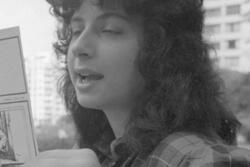The Unsung Jewish Women of WWII
In the annals of WWII history, the names Dahlia Johnston and Bea Cohen are just footnotes. That isn’t a bad thing, for all great histories need their supporting casts and their names shine brightly from the margins. However, it is important to memorialize all stories, big and small, recognizing that many women's narratives haven't been considered important or consequential enough for inclusion in the histories we teach and are taught.
Statistically, historians focus most on male subjects especially when detailing the history of war. By bringing some of these stories to light, I hope to break that trend and pull these women’s contributions out of the footnotes and into the main text, front and center. It is the small actions of unsung heroes like Johnston and Cohen that enable our world to turn and set the stage for capital “H” History.
Dahlia “Pobie” Johnston was born in Philadelphia in 1922 to immigrant parents. It was America’s acceptance of immigrants that inspired her to lead a life of service to her country. At age 21 in December 1942, Johnston enlisted in the US Army, “with clear intent that [she] would win the war for the US.” In Daytona Beach, Florida she entered basic training, and was given the position of cook, one she was not formally prepared for. She was later reassigned to the personnel office, where she attained the rank of Sergeant. There, Johnston was given the monumental task and the logistical nightmare of processing discharges at the end of the war.
In her spare time, she trained civilians, something that took her superiors by surprise. They seemed shocked by a woman with initiative. It was estimated that she discharged thousands of personnel. After the war, she settled in Stamford, CT, where she ran for mayor unsuccessfully three times. The city has still never had a woman mayor, but as Angella Carella argues in the Stamford Advocate, Johnston should have been the first.
If none of this seems remarkable, consider how unlikely it was for a woman to attain the rank of Sergeant and to command an entire unit, men included, before the war. Women had a distinct role in society—to be caretakers, homemakers, and mothers—and that role was not, for the most part, one with authority. In this way, World War II was a turning point for the emancipation of women and helped lay the groundwork for the women’s movements of the ’60s and ’70s.
Let’s take a look at another woman’s story. Romanian immigrant Beatrice “Bea” Cohen was a real life “Rosie the Riveter.” Driven by her gratitude to the US for welcoming her as an immigrant, she enlisted in the service during WWII. In the army, she eventually rose in the ranks, mimeographing top-secret documents in London.
As a part of the National Ladies Auxiliary of the Jewish War Veterans, Cohen helped children with cerebral palsy and continued to actively work to better the lives of veterans. Before her death, she was the oldest living female veteran in California. As her daughter said in an interview with The LA Times, “She always said there was still more to do. Mother just always felt that she wanted to help other people.”
Pobie and Bea’s stories are not ones you'll learn about in a textbook, but that doesn't render them unimportant. As Chloe Angyal writes in her recent piece for Huffington Post, it is women who “write the shopping lists and birthday cards and absence notes, documents that rarely make it into our history books.” It is the accomplishments of everyday women that shape our world and change our collective future. Let’s tell their stories, too.








Toshe, Pobie and Bea's stories WERE told! They were both interviewed for the PBS documentary, GI JEWS: Jewish Americans in World War II...
good to know, thank you for bringing Cohen's and Johnston's contributions to light